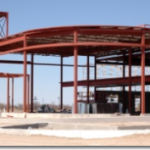 In short, Civil engineering belongs to a professional engineering discipline and Site engineering falls into a sub-discipline of Civil engineering. However, these disciplines are different in nature. Many people have the misconception that these two are one in the same.
In short, Civil engineering belongs to a professional engineering discipline and Site engineering falls into a sub-discipline of Civil engineering. However, these disciplines are different in nature. Many people have the misconception that these two are one in the same.
In this article, we will go through the fundamental differences between site design engineering and civil engineering.
What is Civil engineering and Site Design Engineering?
Civil engineering disciplines
As mentioned above, civil engineering is split into many sub-disciplines.
However, civil engineers mainly deal with design, maintenance of the physical and naturally built environments such as bridges, canals, dams, roads, construction, structural components of buildings, railways, airports, sewerage systems, pipelines, etc.
Due to many sub-disciplines of civil engineering, the engineers’ duties vary from one another. Here is a brief elaboration on some of the main categories of Civil – engineering.
- Coastal engineering is mainly focused on managing coastal areas and defending them against flooding and erosion.
- Construction engineering covers the material transportation, hydraulic site development, planning and execution, environmental, structural, and geotechnical engineering. Construction engineers have a higher responsibility than other areas of engineering, and they should take care of evaluating logistical operations, drafting and reviewing contracts, and monitoring supplies’ prices, etc.
- Earthquake engineering is majorly focused on designing buildings to withstand earthquakes.
- Environmental engineering mainly covers the areas of air pollution, water purification, recycling, hazardous waste management, etc.
- Forensic engineering discipline is predominantly used for civil law cases and criminal law cases. The engineers investigate malfunctioned products, materials, structures, or components that caused personal injury or damage to property.
- Geotechnical engineering explores knowledge from fields such as soil science, materials science, mechanics, and hydraulics to design foundations and other structures, etc.
- Materials science and engineering is focused on studying the characteristics of materials. They might be ceramics, concrete and mix asphalt concrete, strong metals such as steel and aluminum, etc.
- Structural engineering is involved in the structural design and structural analysis of bridges, towers, etc.
- Municipal or urban engineering takes care of the municipal infrastructure.
- Water resources engineering is focused on managing and collecting water as a natural resource.
- Civil engineering systems is an area that is concentrated in using systems to change and manage the intricacy in Civil engineering because its public context is much wider.
- The surveying process involves measuring dimensions on a surface of the earth by a surveyor. These data that are collected in a survey is crucial to generate an accurate map of the earth’s surface. Moreover, the data is used by civil engineers, contractors, and realtors to manipulate the information to design and build. However, land surveyors aren’t categorized as engineers.
Site Design Engineering
On the other hand, site design engineering or construction site engineering involves administration and quality control of construction works. This process starts from the design stage until the completion.
Site engineers are predominantly involved in visiting project sites, preparing construction plans, meeting with stakeholders, etc.
Moreover, site engineers are the people who act as construction site managers because they hold fundamental information and quality control decisions regarding a construction team. In terms of managing construction projects, hiring a site engineer is a huge investment. The reason is these engineers are excelled in their job to utilize resources and eventually produce perfect and successful development projects.
So what are the differences?
- The project development and execution
In civil engineering, the engineers are involved with the technical and feasibility studies while investigating the sites. They use several computer software depending on the development project and create detailed designs. The engineers should also analyze intricate calculations.
The site design engineers, make sure that the development project is continuing according to the final construction plan. They should be able to interpret and implement those construction designs accordingly. They should conduct thorough site inspections as well. Site design engineers plan site activities and create site schedules.
Another important task of a site design engineer is to undertake surveys before the actual execution of the project. These surveys are required to do prior to transferring a land title, before the land is subdivided, prior to initiating developments on land such as buildings, pools, fences, roads or buildings, etc.
- Gathering documentation
Civil engineers are responsible for keeping close contact with their clients. In addition, they should always take the opinions of industry professionals such as architects and sub-contractors.
The site design engineers coordinate with contractors and sub-contractors. The other task of a site design engineer is to monitor and maintain the quality control and the performance of these contractors and sub-contractors.
Likewise, one of their main jobs is to record and maintain every single detail of the current development project. Moreover, this technical documentation should be maintained properly. The other important task of a site engineer is to process day-to-day site information such as Submittals, RFI’s, and Shop drawings.
- Safety of the project
Civil engineers compile job specifications and supervise tendering procedures. On top of that, they strategically resolve day-to-day design and development issues. Depending on the current project, civil engineers make sure if the said project complies with the legal requirements. They are responsible for confirming that there are no environmental or sustainability impacts on this project. Furthermore, health and safety should be the number 1 priority.
Site design engineers, on the other hand, implement and maintain these safety standards on the construction sites. They should supply on-site decisions and technical advice for the project as well.
- Budgets of the project
Civil engineers manage budgets and project resources making sure that required material and equipment are purchased and delivered according to a schedule.
Site design engineers have a responsibility to ensure that the current project is on par with the estimated budget and deadline. Likewise, they should take the lead in purchasing and negotiating the price of the required materials and supplies.
- Completion of the project
Regardless of the project that they are currently working on, Civil engineers should ensure that the development of the structures runs smoothly and is completed within the allocated time and budget.
A site design engineer is responsible for reporting the site progress to the consultants and owners on a regular basis. The completion of the project and the quality depend on the small work details they provide.
Conclusion
Civil engineering and site design engineering might have tiny differences. But the bottom line is these two fields are intertwined -without one another a development project cannot be completed as expected. We would love to chat with you about your upcoming project. Reach out to us today, HERE.








